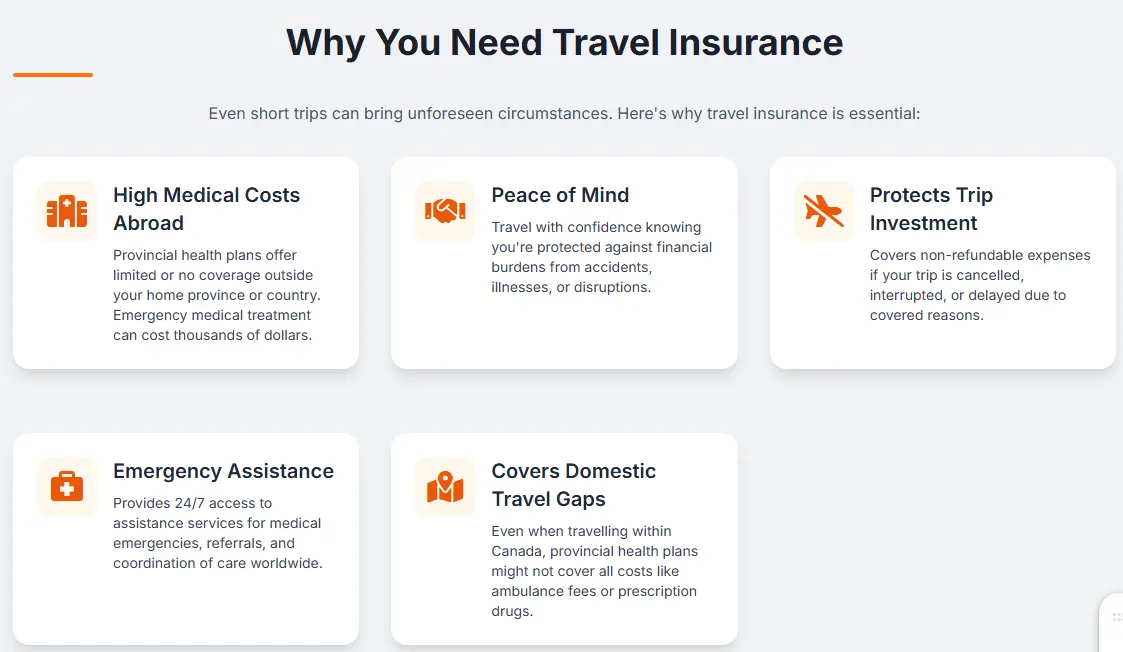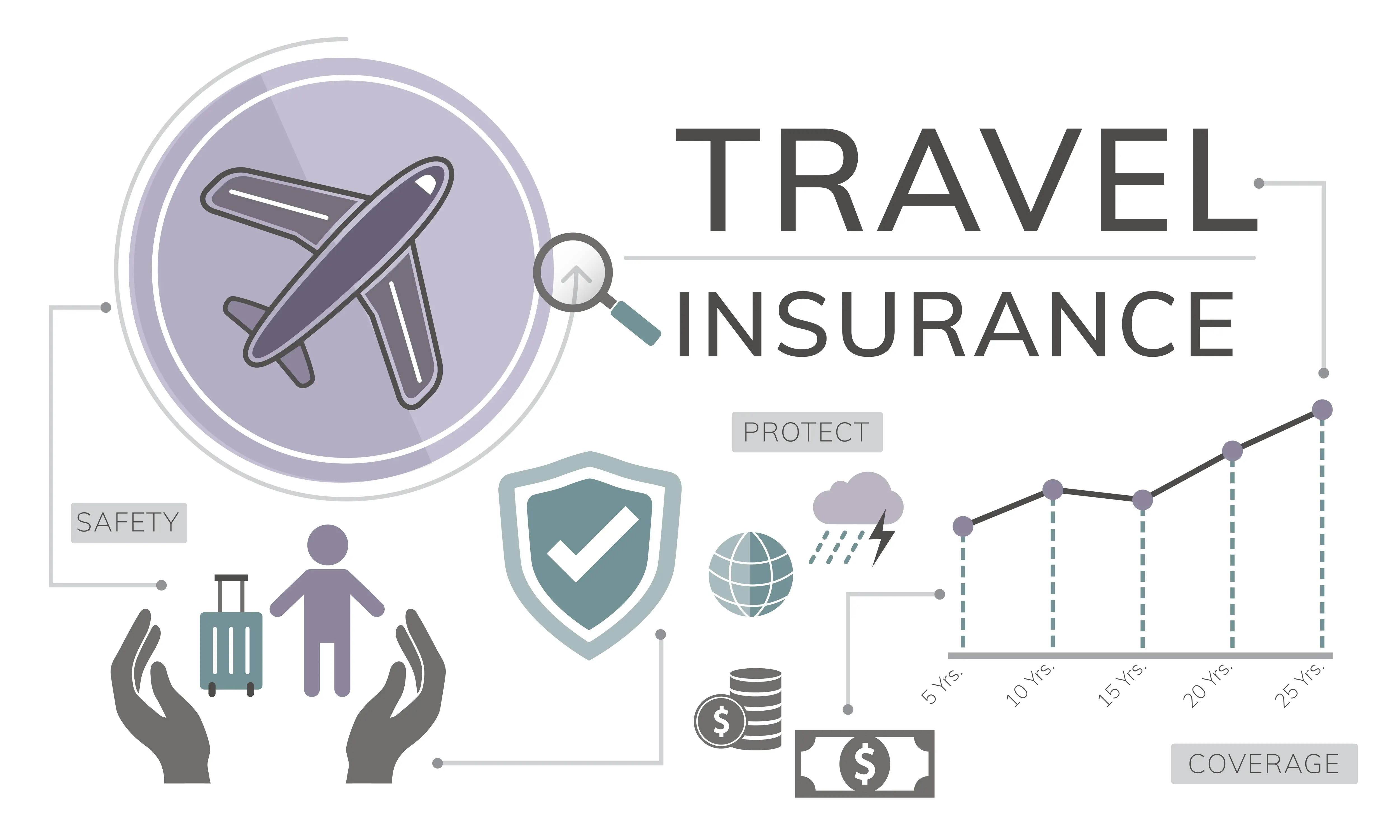Travel Insurance in Canada: How to Choose the Best Plan for Your Trip
Published on June 17, 2025 | By WealthFusions Finance Team

Whether you’re planning a weekend getaway or an international adventure, travel insurance is essential to protect yourself from unexpected costs such as medical emergencies, trip cancellations, or lost baggage. This guide breaks down the most important factors to consider when selecting a travel insurance plan in Canada, including coverage types, costs, and provider comparisons backed by data. By the end, you’ll be ready to choose a plan that fits your trip and budget perfectly.
1. Understand the Types of Travel Insurance Coverage
Travel insurance typically covers several key areas:
- Emergency Medical Coverage: Covers hospital and medical expenses abroad.
- Trip Cancellation & Interruption: Reimburses prepaid costs if your trip is canceled or cut short.
- Baggage Loss & Delay: Compensation for lost, stolen, or delayed luggage.
- Flight Delay & Missed Connections: Covers costs from delayed or missed flights.
- Accidental Death & Dismemberment: Pays benefits in case of serious injury or death during travel.
Data Insight: According to the Insurance Bureau of Canada (IBC), about 60% of Canadian travelers purchase emergency medical coverage, while only 25% opt for trip cancellation protection.
2. Compare Coverage Limits and Exclusions
Not all plans offer the same level of protection. Here’s a comparison of typical coverage limits from popular Canadian insurers:
| Provider | Medical Coverage | Trip Cancellation | Baggage Coverage | Pre-existing Condition Coverage | Price Range (per trip) |
|---|---|---|---|---|---|
| Manulife | $5 million | $10,000 | $2,000 | Available with additional premium | $50 – $150 |
| Sun Life Financial | $2 million | $5,000 | $1,500 | Excluded | $40 – $120 |
| Blue Cross | $10 million | $15,000 | $2,500 | Covered with declaration | $60 – $180 |
| RSA Travel Insurance | $5 million | $10,000 | $2,000 | Excluded | $45 – $130 |
3. Consider Pre-existing Medical Conditions
If you have chronic health issues, this is critical. Many plans exclude coverage for pre-existing conditions unless you:
- Purchase insurance soon after booking your trip (usually within 10–21 days).
- Provide full medical disclosure and pay an additional premium.
- Choose a plan that specifically covers pre-existing conditions.
Example: Blue Cross offers pre-existing condition coverage if declared at purchase; others like Sun Life exclude it.
4. Analyze Trip Length and Destination
Prices and coverage often depend on trip duration and where you’re going. Here are some trends:
- Short domestic trips: Usually cheaper, with basic emergency coverage sufficing.
- International trips: Require higher medical coverage limits (≥$5 million).
- Extended stays (over 60 days): Often require special annual plans or multi-trip insurance.
Data point: International travel insurance premiums can range from $5/day to $15/day depending on destination and coverage.
5. Check COVID-19 and Pandemic Coverage
Since 2020, many insurers have updated policies to address pandemic risks. Some include:
- Coverage for COVID-19 medical treatment abroad.
- Trip cancellation if you or a family member test positive.
- Quarantine costs reimbursement.
Tip: Verify the latest policy wording carefully as coverage varies widely between providers.
6. Review Claims Process and Customer Support
Fast and transparent claims handling can save stress and money:
- Look for 24/7 emergency assistance hotlines.
- Check average claim settlement times (top insurers average 7–10 days).
- Read customer reviews on support responsiveness and claim fairness.
Example: Manulife scored 4.5/5 for claims satisfaction in a 2024 Canadian Consumer Survey.
7. Evaluate Additional Perks & Benefits
Some plans offer extras such as:
- Rental car collision coverage.
- Travel assistance services (lost passport, legal help).
- Coverage for adventure sports and activities (skiing, scuba diving).
Note: These add-ons often increase premiums but are worth it for certain travelers.
8. Use Online Comparison Tools & Read the Fine Print
Use sites like travelinsurance.ca or insurancetop to compare quotes and features side-by-side.
Final reminder: Always read policy exclusions and coverage limits carefully before purchasing.
Conclusion & What to Do Next
Choosing the right travel insurance plan is vital for peace of mind and financial protection on your trip. Assess your health needs, trip details, and budget before comparing policies. Don’t hesitate to ask your insurer about COVID-19 coverage and pre-existing conditions.
Contact WealthFusions to get personalized travel insurance recommendations and exclusive Canadian offers tailored to your next trip!
Frequently Asked Questions
- 1. Is travel insurance mandatory for Canada?
- No, but many countries require proof of insurance to issue a visa, and it protects you from high emergency costs abroad.
- 2. Does provincial health care cover medical emergencies abroad?
- Only partially. Most provinces reimburse a fraction of actual costs, so private travel insurance is recommended.
- 3. Can I buy travel insurance after booking my trip?
- Yes, but to cover pre-existing conditions or trip cancellation, buy it within 10–21 days of booking.
- 4. Are adventure sports covered?
- Only if specified. Standard plans exclude high-risk activities like skiing or scuba diving unless added.
- 5. What if my trip is delayed due to weather?
- Many plans cover trip delays and additional accommodation expenses up to a limit.
- 6. How do I file a claim?
- Contact your insurer immediately, provide all receipts and documents, and submit claim forms online or via app.
- 7. Does travel insurance cover COVID-19?
- It varies widely; check your policy carefully for medical treatment, quarantine, and cancellation related to COVID-19.
- 8. Can I get multi-trip travel insurance?
- Yes, annual plans cover multiple trips within 12 months, often more cost-effective for frequent travelers.

